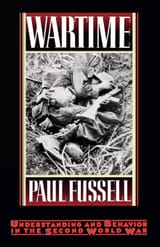Search Results
6/26/2025, 2:59:55 AM
>"For the past fifty years the Allied War has been sanitized and romanticized almost beyond recognition by the sentimental, the loony patriotic, the ignorant, and the bloodthirsty. I have tried to balance the scales."
>With those two sentences Paul Fussell, a severely wounded Second World War veteran turned literary critic and scholar, ends the first paragraph of the preface in "Wartime: Understanding and Behavior in the Second World War." It's a shattering book. Using primary source materials Fussell demonstrates, from the average Allied soldier's point of view, the war was fought in an ideological vacuum devoid of higher meaning. He also debunks the fantasy that many citizens and soldiers needed to believe to keep up morale: the Allies were all good, the Axis all evil. This fantasy has survived.
>The men in the trenches, jungles and beaches knew this to be bunk, for it was they who stepped in the guts of their comrades and enemies. And it was they who resented the sanitized, uninformed version of events that was presented to the American and, to a lesser extent, British people. As a result, the war years eroded critical thinking and originality, to say nothing of the willingness to confront difficult moral questions. (British civilians tasted war in 1940 in ways American civilians never did throughout the entire conflict).
>Said British Officer Neil McCallum,
>"The game does not appear to be worth the candle. What is seen through the explosions is that this, no less than any other war, is not a moral war." Fussell describes McCallum's depiction of actuality as "an implicit warning against the self-delusive attempt to confer high moral meaning on these grievous struggles for survival."
>With those two sentences Paul Fussell, a severely wounded Second World War veteran turned literary critic and scholar, ends the first paragraph of the preface in "Wartime: Understanding and Behavior in the Second World War." It's a shattering book. Using primary source materials Fussell demonstrates, from the average Allied soldier's point of view, the war was fought in an ideological vacuum devoid of higher meaning. He also debunks the fantasy that many citizens and soldiers needed to believe to keep up morale: the Allies were all good, the Axis all evil. This fantasy has survived.
>The men in the trenches, jungles and beaches knew this to be bunk, for it was they who stepped in the guts of their comrades and enemies. And it was they who resented the sanitized, uninformed version of events that was presented to the American and, to a lesser extent, British people. As a result, the war years eroded critical thinking and originality, to say nothing of the willingness to confront difficult moral questions. (British civilians tasted war in 1940 in ways American civilians never did throughout the entire conflict).
>Said British Officer Neil McCallum,
>"The game does not appear to be worth the candle. What is seen through the explosions is that this, no less than any other war, is not a moral war." Fussell describes McCallum's depiction of actuality as "an implicit warning against the self-delusive attempt to confer high moral meaning on these grievous struggles for survival."
Page 1
